Blessed Are Those Who Thirst Read online
Praise for Anne Holt’s
Blind Goddess and 1222
“Step aside, Stieg Larsson. Holt is the queen of Scandinavian crime thrillers.”
—Red Magazine (UK)
“A good old-fashioned murder mystery. Wherever Hanne shows up next, my advice is to follow that wheelchair.”
—Marilyn Stasio, The New York Times Book Review
“Anne Holt is the godmother of modern Norwegian crime fiction.”
—Jo Nesbø, author of The Snowman
“Holt proves a masterful plotter. Unexpected twists hold up to scrutiny, loose ends are tied up, and the finale leaves readers wanting more.”
—The Cleveland Plain Dealer
“In the hard-boiled vein of Dashiell Hammett. It’s a good old-fashioned mystery.”
—Pittsburgh Post-Gazette
Thank you for purchasing this Scribner eBook.
* * *
Join our mailing list and get updates on new releases, deals, bonus content and other great books from Scribner and Simon & Schuster.
CLICK HERE TO SIGN UP
or visit us online to sign up at
eBookNews.SimonandSchuster.com
CONTENTS
Sunday, May 9
Monday, May 10
Sunday, May 16
Tuesday, May 18
Saturday, May 22
Saturday, May 29
Monday, May 31
Tuesday, June 1
Wednesday, June 2
Thursday, June 3
Friday, June 4
Saturday, June 5
Sunday, June 6
Monday, June 7
Tuesday, June 8
Wednesday, June 9
Thursday, June 10
Death of the Demon Excerpt
About Anne Holt
To Even, my friend and brother
Blessed are those who hunger and thirst after righteousness, for they will be filled.
—MATTHEW 5:6
SUNDAY, MAY 9
It was so early not even the devil had managed to put on his shoes. In the west, the heavens showed that intense hue only a Scandinavian sky in springtime is blessed with—royal blue on the horizon and lighter toward the meridian, before dissolving into a pink eiderdown where the sun was still lying lazily in the east. The air was invigorating, undisturbed by the dawn, with that amazing transparency possessed by radiant spring mornings at almost sixty degrees north. Although the temperature remained in single figures, everything indicated it would be another warm May day in Oslo.
Detective Inspector Hanne Wilhelmsen wasn’t thinking about the weather. She was standing completely motionless, wondering what she should do. There was blood everywhere. On the floor. Across the walls. Even on the ceiling, dark spatters resembled the abstract pictures in some kind of psychological test. She tilted her head and stared at a splodge directly above her. It looked like a purple bull with three horns and deformed hindquarters. She stood motionless—a sign of indecision, but also an indication of her fear of sliding on the slippery floor.
“Don’t touch,” she warned brusquely, when a younger colleague, who had hair color to match the blood, made a move to lay his finger on one of the walls. A narrow crack in the ramshackle roof cast a dusty beam of light on the rear wall, where the blood was spread so generously it looked less like a drawing than a horrendously bad paint job.
“Go outside,” she ordered. Hanne sighed but refrained from commenting on the footprints the inexperienced police constable had scattered around large areas of the floor. “And try to walk in your own footprints on your way out.”
A couple of minutes later, she did the same herself, backward and hesitant. She continued to stand in the doorway, having sent the officer for a flashlight.
“I was just going for a piss,” wheezed the man who had called in the report. Obediently, he had remained standing outside the shed. Now he was hopping so agitatedly Hanne Wilhelmsen suspected he hadn’t been able to complete his mission an hour earlier.
“The lavatory is there,” he said, quite unnecessarily. The strong smell from one of Oslo’s all too many remaining outside toilets took the edge off the sickeningly sweet stench of blood. The door marked with a heart was right beside it.
“Well, off you go to the toilet,” she encouraged him in a friendly tone, but he didn’t hear her.
“I was going for a piss, you see, but then I saw the door in there was open.”
Now he pointed at the woodshed, taking a step backward, as though a hideous animal might thrust out its jaws at any moment and gobble up his whole arm.
“It’s usually closed. Not actually locked, but closed. The door is so heavy it stays open by itself. We don’t want stray dogs and cats making themselves at home in there. So we’re quite careful about that.”
A strange little smile spread across his coarse face. It occurred to Hanne that they looked after things even in this neighborhood; they had rules and kept order, even though the battle against decay was being lost.
“I’ve lived here in this block all my life,” he continued, with a touch of pride. “I notice when things aren’t as they should be.”
He glanced at the pretty young lady who didn’t look like any cop he had seen before, waiting for a scrap of recognition.
“Good stuff,” she praised him. “It was great you phoned to let us know.”
When he smiled, with his mouth open, Hanne was struck by how few teeth he possessed. He couldn’t be very old, perhaps fifty.
“I was absolutely terrified, you understand. All that blood . . .”
His head moved from side to side. It had been awful, being faced with such a diabolical sight.
Hanne could well appreciate that. Her red-haired colleague had returned with a flashlight. Gripping it with both hands, Hanne Wilhelmsen shone the beam of light systematically from side to side down over the walls. She scrutinized the ceiling as thoroughly as was possible from the doorway, and then zigzagged the ray of light across the floor.
The room was entirely empty. Not so much as a stick of firewood, only some odds and ends attesting that the shed had once been used for its original purpose, probably a long time ago. Once the flashlight had made contact with every single square meter, she ventured into the shed once more, carefully stepping on her own old footprints. She gave a hand signal that told her colleague not to follow. Right in the middle of the room, approximately fifteen square meters, she hunkered down. The beam of light stirred on the wall opposite, about a meter above the floor. From the doorway she had noticed something, perhaps letters, written in smeared blood, making the symbols difficult to decipher.
They weren’t letters. They were numbers. Eight digits, as far as she could make out: 92043576. The figure 9 was unclear and might perhaps be 4. The final digit looked like a 6, but she was not sure. Maybe it was an 8 instead. She straightened up and stepped back again into the daylight, now abundant. She heard a baby crying from an open window on the second floor and shuddered at the thought of children having to live in such a district. A Pakistani in a tram driver’s uniform emerged from the brick building, peering nosily at them for a moment before scurrying away from the entrance. She could see in the reflections on the highest windows that the sun had hauled itself up at last. Birds, the small gray ones that still managed to eke out a meager existence in the innermost center of the city, were chirping tentatively from a half-dead birch tree that was making a futile attempt to reach out toward the streaks of morning light.
“Bloody hell, what a terrible crime this must be,” the young constable commented as he spat, in a vain effort at ridding himself of the taste of sewage. “Something terrible must have happened here!”
He seemed
happy at the thought.
“Yes indeed,” Hanne Wilhelmsen said softly. “Something serious may well have happened here. But in the meantime . . .”
She broke off and turned to face her colleague.
“At the moment, this isn’t a crime. For that, we need a victim. We haven’t seen a single trace of that. At the most, this is willful vandalism. But . . .”
She peered through the door again.
“Of course, something might turn up. Contact Forensics. It’s best to be on the safe side.”
She shivered slightly. It was due more to her speculation about what she had just witnessed rather than the fresh morning air. Pulling her jacket snugly around her, she thanked the toothless man one more time for alerting them before strolling on her own back the three hundred meters to Oslo police headquarters. When she crossed over to the other side of the street, into range of the morning sunlight, it grew warmer. A tumult of international women’s voices, morning shouts in Urdu, Punjabi, and Arabic, reverberated around the corners of the houses. A kiosk owner was going about his business, readying his sidewalk stand for another long working day, opening out the whole shebang with no consideration for either churchgoing or regulations about opening hours. He flashed a friendly white smile at her, holding out an orange and raising his eyebrows questioningly. Hanne Wilhelmsen shook her head and smiled in return. A gang of fourteen-year-old boys was clattering over the sidewalk with their blue Aftenposten newspaper delivery buggies in tow. Two veiled women hurried to some destination or other, eyes downcast. They walked in a large arc around the detective inspector, unused to seeing white women so early in the day. Otherwise, it was fairly deserted. In this weather, even Tøyen took on a conciliatory, almost charming character.
It certainly promised to be yet another beautiful day.
MONDAY, MAY 10
What on earth were you working on over the weekend? Don’t you think we have enough of a slog every day of the week?”
Police Attorney Håkon Sand was standing in the doorway. His jeans were new, and for once he was wearing a jacket and tie. His jacket was slightly too large and his tie was a touch too broad, but nevertheless he looked reasonably put together. Apart from the hemline on his jeans. Hanne Wilhelmsen couldn’t resist leaning in front of him, speedily tucking the superfluous centimeters inside so they couldn’t be seen.
“You shouldn’t walk about with the turn-up on the outside.” She gave a friendly smile and stood up. She smoothed her hand down his arm with a light, almost tender, movement.
“There. Now you’re fantastic. Are you going to court?”
“No,” replied the prosecution attorney, who, despite the well-meaning gesture, felt embarrassed. Why did the detective inspector have to draw attention to his lack of fashion sense? She could have saved herself the trouble of doing that, he thought, though he said something different.
“I’ve a dinner date right after work. But what about you, why were you here?”
A pale green folder hung poised in the air before landing precisely on Hanne Wilhelmsen’s blotter.
“I just received this,” he went on. “Strange case. There have been no reports of either dismembered people or animals in our area.”
“I did an extra shift in the crime section,” she explained, leaving the folder untouched. “They’re struggling with illness down there right now.”
The police prosecution attorney, a dark-haired and reasonably good-looking man whose temples were grayer than his thirty-five years would suggest, flopped onto the visitor’s chair. He removed his glasses and sat polishing them with the end of his tie. The spectacles did not become particularly clean, but the tie became decidedly more crumpled.
“The case has been assigned to the two of us. If there is a case, that is. There’s no victim, no one has heard anything, no one has seen anything. Odd. There are some pictures in there.”
He pointed toward the folder.
“I don’t need those, thanks.” She waved dismissively. “I was there. It really didn’t look very pretty.
“But you know,” she continued, leaning toward him, “if all of that turns out to be human blood, then there must have been two or three people killed in there. I’m inclined to think there are some young hooligans having some fun with us.”
The theory didn’t seem improbable. The Oslo police were in the middle of their worst spring ever. In the course of six weeks, three murders had been visited upon the city, and at least one of these seemed unsolvable. There had been no fewer than sixteen cases of rape reported in the same period, with seven of these becoming the object of enormous media attention. The fact that one of the victims was a member of Parliament for the Christian Democrats, on her way home from an evening committee meeting when she was brutally assaulted in the Palace Park, inflamed public disappointment in the lack of progress made by the police. Well aided by the tabloid press, the frustrated citizens of Oslo had started to protest against the Oslo police’s apparent inability to act. The elongated, curved building sat there at Grønlandsleiret 44, gray and unshakable, seemingly unmoved by all the merciless criticism. Its inhabitants arrived at work in the mornings with shoulders drawn up and eyes downcast. They went home again far too late each day, their backs bent and nothing more to show for their daily toil than still more confirmed dead ends. The weather gods played around tauntingly with intense summer temperatures. The awnings were pulled right down, in vain, over all the windows on the south façade of the enormous building, making it appear both blind and deaf. The interior remained just as stifling. Nothing helped, and nothing seemed to show the way out of a professional blind alley that simply increased with every new case entered into the huge data systems. They should be of assistance but instead appeared hostile, almost mocking, each morning when they spewed out their lists of unsolved cases.
“What a springtime,” Hanne Wilhelmsen said, sighing theatrically. With a look of resignation, she raised her eyebrows and contemplated her superior officer. Her eyes were not especially large, but they were amazingly blue, with a distinctive black edge around the iris making them appear darker than they were. Her hair was dark brown and quite short. From time to time she tugged at it absentmindedly, as though she actually wished it were long and thought it would hasten its growth if she helped it along a little. Her mouth was generous, with a cupid’s bow that didn’t simply dip down from the top but also met its twin from below, like a hesitant cleft lip that had changed its mind, thus forming a sensuous curve instead of a defect. Above her left eye she bore a scar parallel to her eyebrow. It was pale pink and not particularly old.
“I’ve never seen it like this. Though I’ve only been here for eleven years. Kaldbakken has been here for thirty. He hasn’t experienced anything like it, either.”
She pulled at her T-shirt and gave it a shake.
“And this heat doesn’t make it any better. The whole city is on the move every single night. A spell of rain right now would be just the thing. That would at least keep people indoors.”
They sat there for too long, talking about everything and nothing. They were friendly colleagues who always had something to talk about but who didn’t know very much about each other all the same. Other than that they both enjoyed their work, that they took it seriously, and that one of them was more competent than the other. That didn’t do much for the relationship between them. She was a highly skilled officer with a reputation that had always been good but following a dramatic case the previous autumn had now reached legendary heights. He had loafed around in the police station as a second-rate lawyer for more than six years, never outstanding, never brilliant. Still, he had built up a reputation for himself as both conscientious and hardworking. He too had played a decisive role in the same sensational case. His reputation was edging more in the direction of solid and dependable than what it had been before: rather uninteresting.
Perhaps they complemented each other. Perhaps it was more the fact they were never in competition that enabled them to
work so well together. However, it was a curious friendship, restricted by the walls of the police station. Police Attorney Håkon Sand was genuinely sorry about that and several times had endeavored to alter the situation. Some time ago he had suggested in passing that they meet up for dinner. The rejection had been so blunt it would be a long time before he made the effort again.
“Oh, well, we’ll let the blood-soaked woodshed lie. I’ve got other things to do.”
The police officer slapped a heap of files sitting in a tray beside the window.
“So have we all,” the attorney retorted, before walking the twenty meters along the corridor to return to his own office.
* * *
“Why have you never brought me here before?”
The woman sitting on the opposite side of the narrow table smiled reproachfully as she squeezed her companion’s hand.
“I didn’t really know whether you liked this type of food,” the man responded, clearly pleased at how successful the meal had been.
The Pakistani waiters, immaculately dressed and with diction indicating they had been born at Aker Hospital rather than a delivery room in Karachi, had amiably steered them through the menu.
“Slightly inconvenient location,” he added. “But otherwise it’s one of my favorite restaurants. Good food, top-notch service, and prices to suit a public servant.”
“So you’ve been here often.” She paused. “Who with, then?”
He didn’t answer but instead raised his glass to hide how mortified he was by the question. All his women had been here. The very short-lived, far fewer than he liked to consider, and the two or three he had endured for a few months. Every time he had been thinking of her. What it would be like to sit here with Karen Borg. And now they were sitting here.
“Don’t think about the ones who were first. Concentrate on being last,” he said with a grin after a moment’s thought.

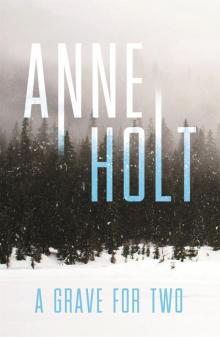 A Grave for Two
A Grave for Two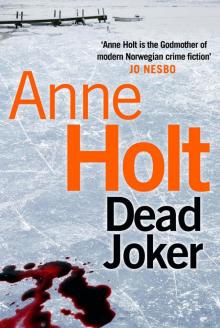 Dead Joker
Dead Joker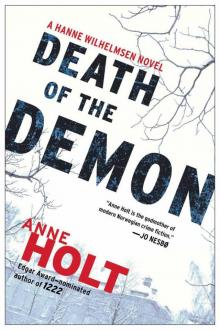 Death of the Demon: A Hanne Wilhelmsen Novel
Death of the Demon: A Hanne Wilhelmsen Novel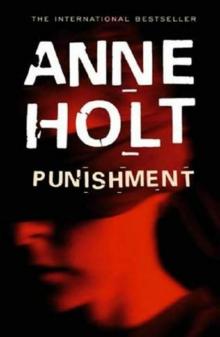 Punishment aka What Is Mine
Punishment aka What Is Mine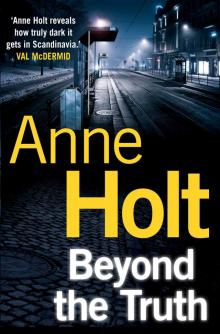 Beyond the Truth
Beyond the Truth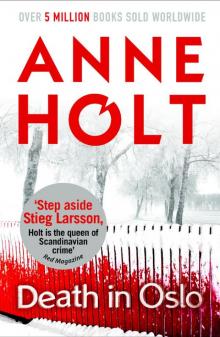 Death in Oslo
Death in Oslo The Blind Goddess
The Blind Goddess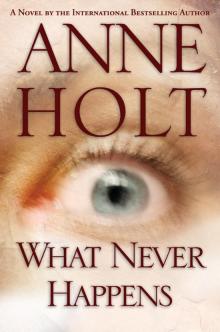 What Never Happens
What Never Happens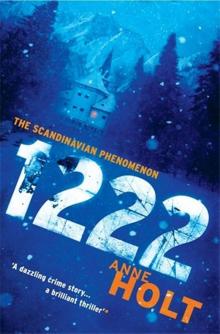 1222
1222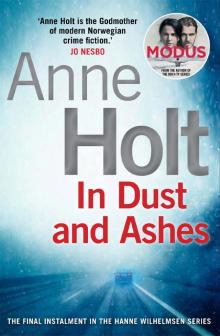 In Dust and Ashes
In Dust and Ashes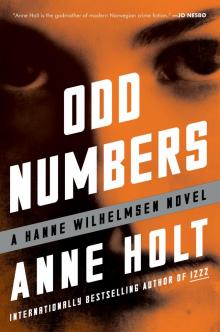 Odd Numbers
Odd Numbers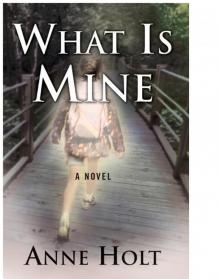 What is Mine
What is Mine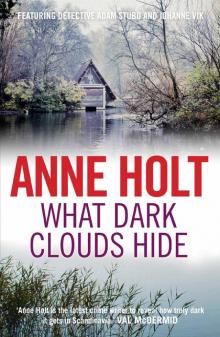 What Dark Clouds Hide
What Dark Clouds Hide Blessed Are Those Who Thirst
Blessed Are Those Who Thirst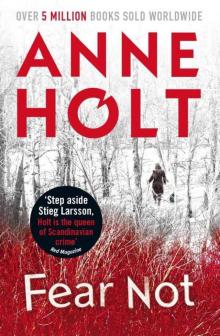 Fear Not
Fear Not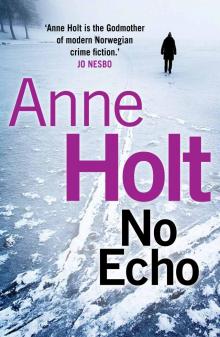 No Echo
No Echo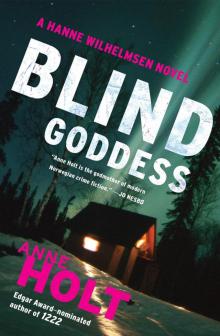 Hanne Wilhelmsen - 01 - The Blind Goddess
Hanne Wilhelmsen - 01 - The Blind Goddess